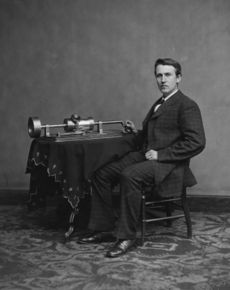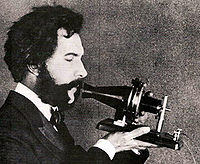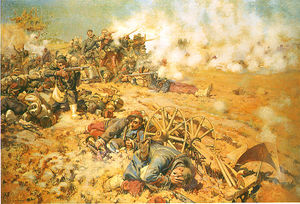1870s
| Millennium: | 2nd millennium |
| Centuries: | 18th century – 19th century – 20th century |
| Decades: | 1840s 1850s 1860s – 1870s – 1880s 1890s 1900s |
| Years: | 1870 1871 1872 1873 1874 1875 1876 1877 1878 1879 |
| Categories: | Births – Deaths – Architecture Establishments – Disestablishments |
The 1870s continued the trends of the previous decade, as new empires, imperialism and militarism rose in Europe and Asia. America was recovering from the Civil War. Germany declared independence in 1871 and began its Second Reich. Labor unions and strikes occurred worldwide in the later part of the decade, and continued until World War I. In America, the Reconstruction era brought a legacy of bitterness and segregation that lasted until the 1960s.
Contents |
Politics and wars
Wars
- Franco-Prussian War (1870–1871) resulted in the collapse of the Second French Empire and in the formation of both the French Third Republic and the German Empire.
- The Anglo-Zulu War lasted from 11 January 1879 to 4 July 1879.
- The Third Carlist War (1872–1876) was the last Carlist War in Spain.
- Russo-Turkish War (1877–1878)
Colonization
- The British Empire continued to grow; this decade marked the beginning of the New Imperialism
Decolonization and Independence
- Bulgaria and Romania declared independence following a war against the Ottoman Empire.
- Passive resistance was used to prevent the confiscation of Māori land at Parihaka in New Zealand
Prominent political events
- The German Empire and Alliance System emerged.
- Racial and economic politics in America's Reconstruction are bitter, pessimistic, and sometimes violent.
- The Gilded Age begins in 1874, lasting until 1896.
Technology

Photograph of Edison with his phonograph, taken by Mathew Brady in 1877

Alexander Graham Bell with a prototype telephone, 1876. The single-port design required the user to alternately speak into and then listen through the same hole.
- The prototype telephone was invented by Alexander Graham Bell in 1876.
- A version of the light bulb was invented by Thomas Edison.
- The phonograph is invented in 1877 by Thomas Edison.
- The steam drill is invented in 1879.
Science
- Ludwig Boltzmann statistically defined thermodynamic entropy.
Environment
- Atlas Bear goes extinct.
Popular Culture
Literature and Arts
- Jules Verne (France) publishes Around The World in Eighty Days
- In the United States, continuation of post-Civil War reconstruction until its conclusion under President Rutherford B. Hayes in 1877
- Monet, Renoir, Pissarro, and Sisley organized the Société Anonyme Coopérative des Artistes Peintres, Sculpteurs, Graveurs ("Cooperative and Anonymous Association of Painters, Sculptors, and Engravers") for the purpose of exhibiting their artworks independently. Members of the association, which soon included Cézanne, Berthe Morisot, and Edgar Degas, were expected to forswear participation in the Salon. The organizers invited a number of other progressive artists to join them in their inaugural exhibition, including the slightly older Eugène Boudin, whose example had first persuaded Monet to take up plein air painting years before.[1] Another painter who greatly influenced Monet and his friends, Johan Jongkind, declined to participate, as did Manet. In total, thirty artists participated in their first exhibition, held in April 1874 at the studio of the photographer Nadar. The group soon became known as the Impressionists.
- Jeanne Calment, born 1875, would eventually become the longest-living human being in recorded history. She lived until 1997, at the age of 122. She still holds the record as of 2010.
- Lewis Carroll publishes Through the Looking-Glass.
- Henrik Ibsen releases A Doll's House in 1879
Fashion
People
World Leaders
- Emperor Franz Josef (Austria-Hungary)
- Prime Minister Sir John A. Macdonald (Canada)
- Prime Minister Alexander Mackenzie (Canada)
- Tongzhi Emperor (China)
- Guangxu Emperor (China)
- Emperor Wilhelm I (German Empire)
- Chancellor Otto von Bismarck (German Empire)
- King Victor Emmanuel II (Italy)
- King Umberto I (Italy)
- Emperor Meiji (Japan)
- Pope Pius IX
- Pope Leo XIII
- Emperor Alexander II (Russia)
- King Alfonso XII (Spain)
- Queen Victoria (United Kingdom of Great Britain and Ireland)
- Prime Minister William Ewart Gladstone (United Kingdom of Great Britain and Ireland)
- Prime Minister Benjamin Disraeli (United Kingdom of Great Britain and Ireland)
- President Ulysses S. Grant (United States)
- President Rutherford B. Hayes (United States)
- Nasser-al-Din Shah of Qajar dynasty (Persia)
See also
- 1870s in sociology
References
- ↑ Denvir (1990), p.32.
